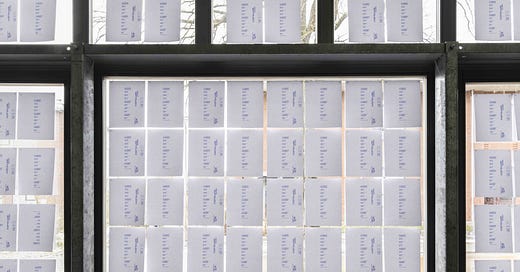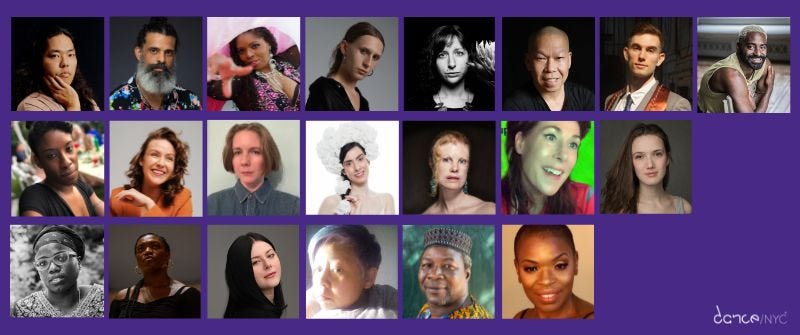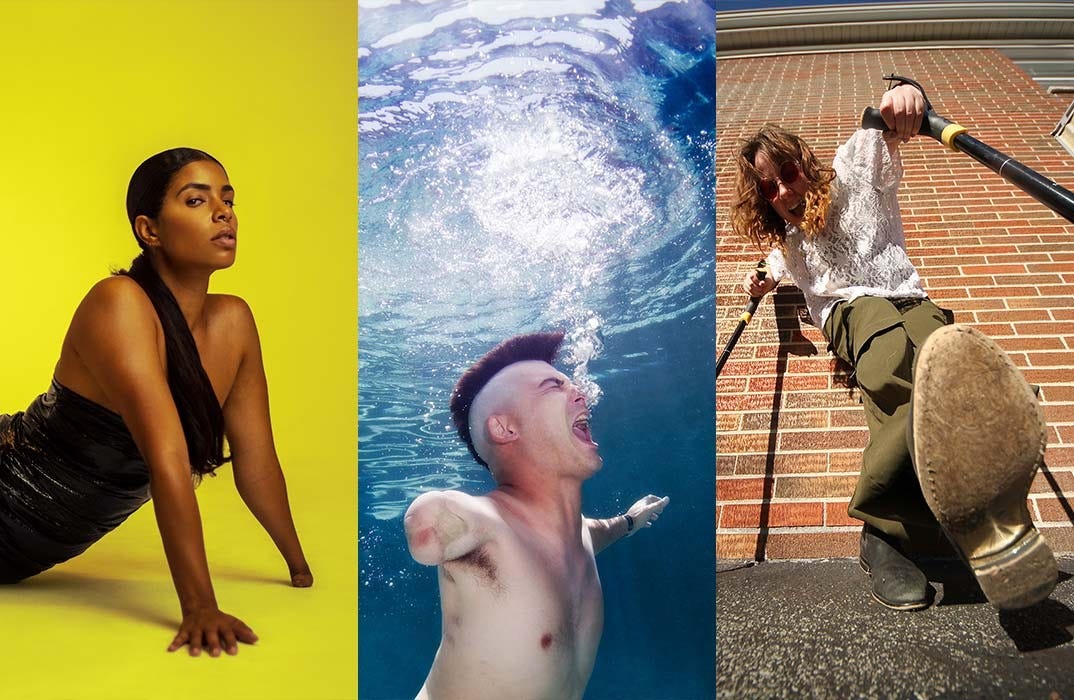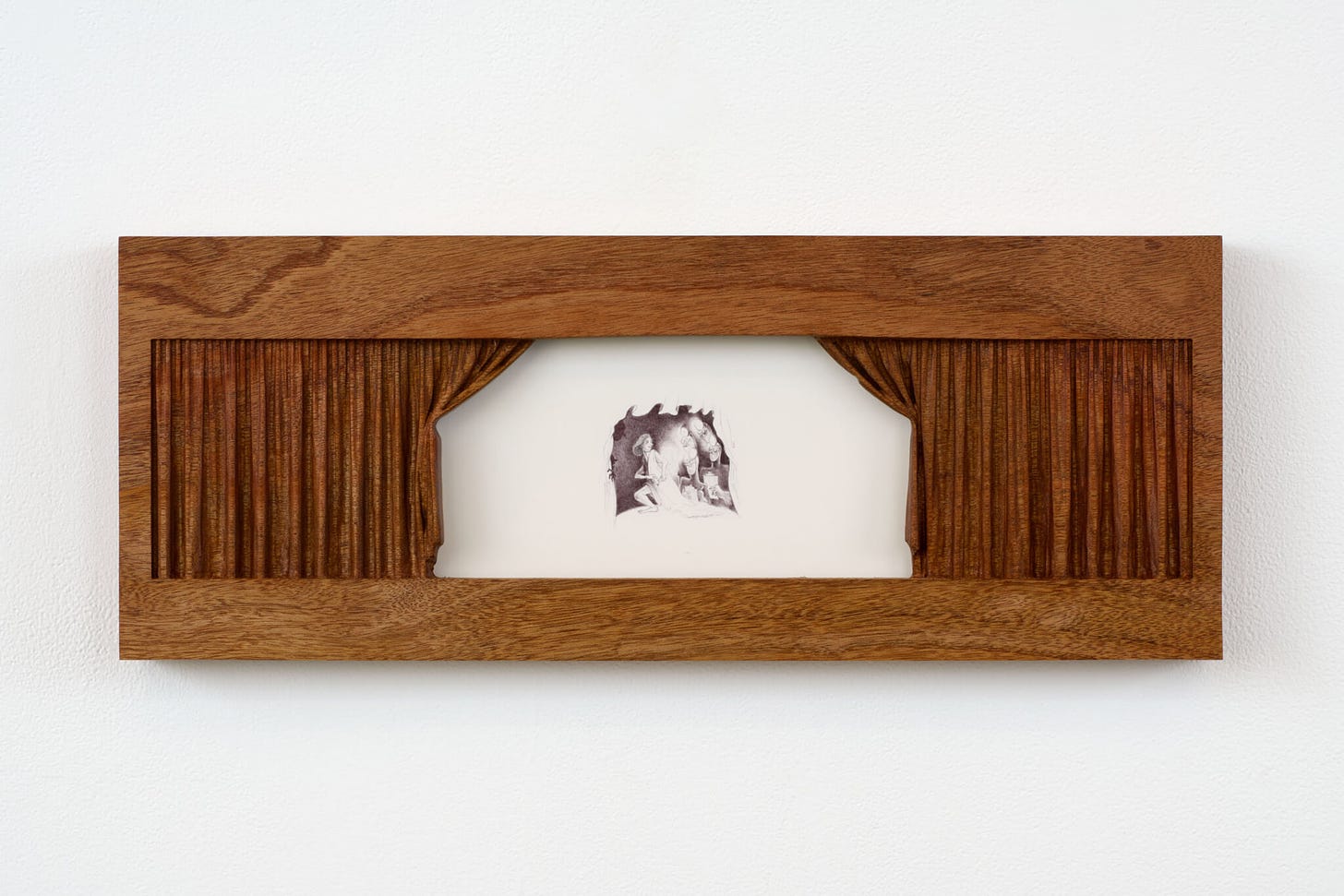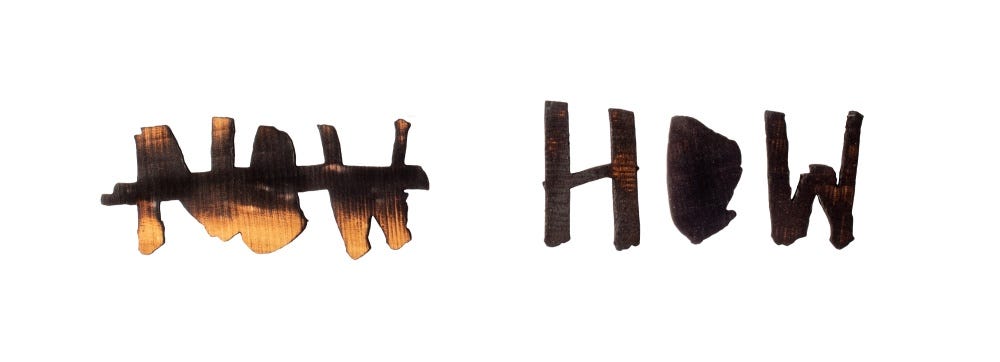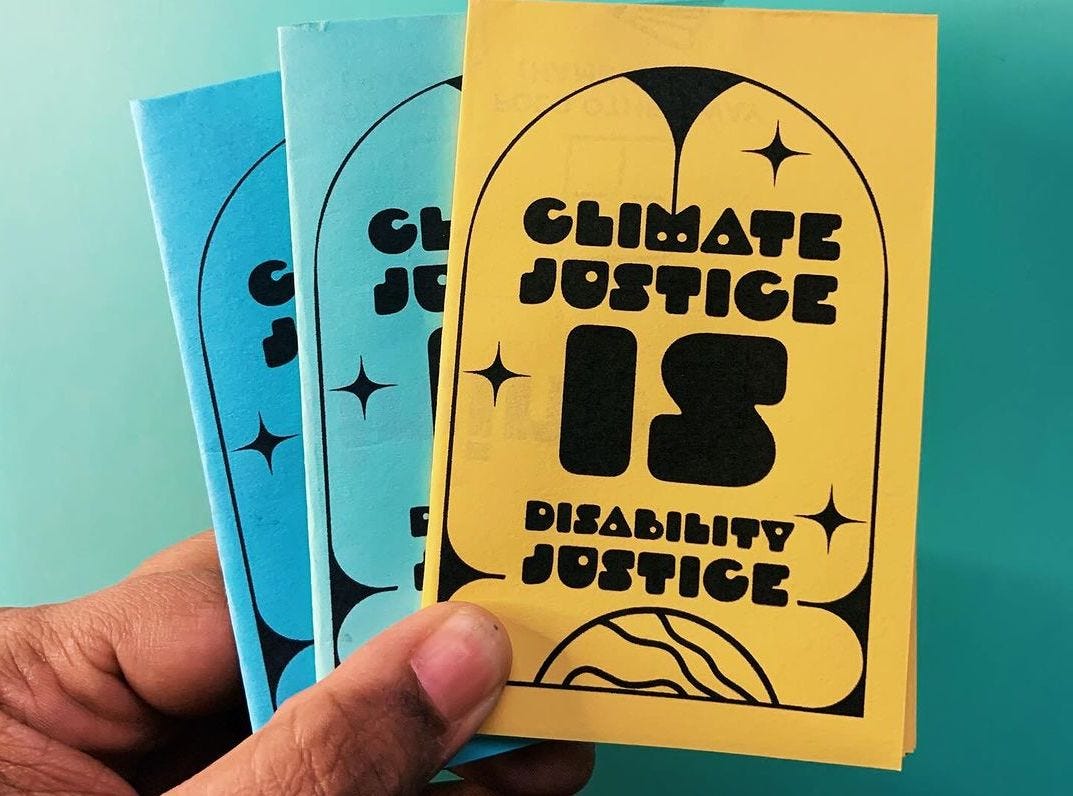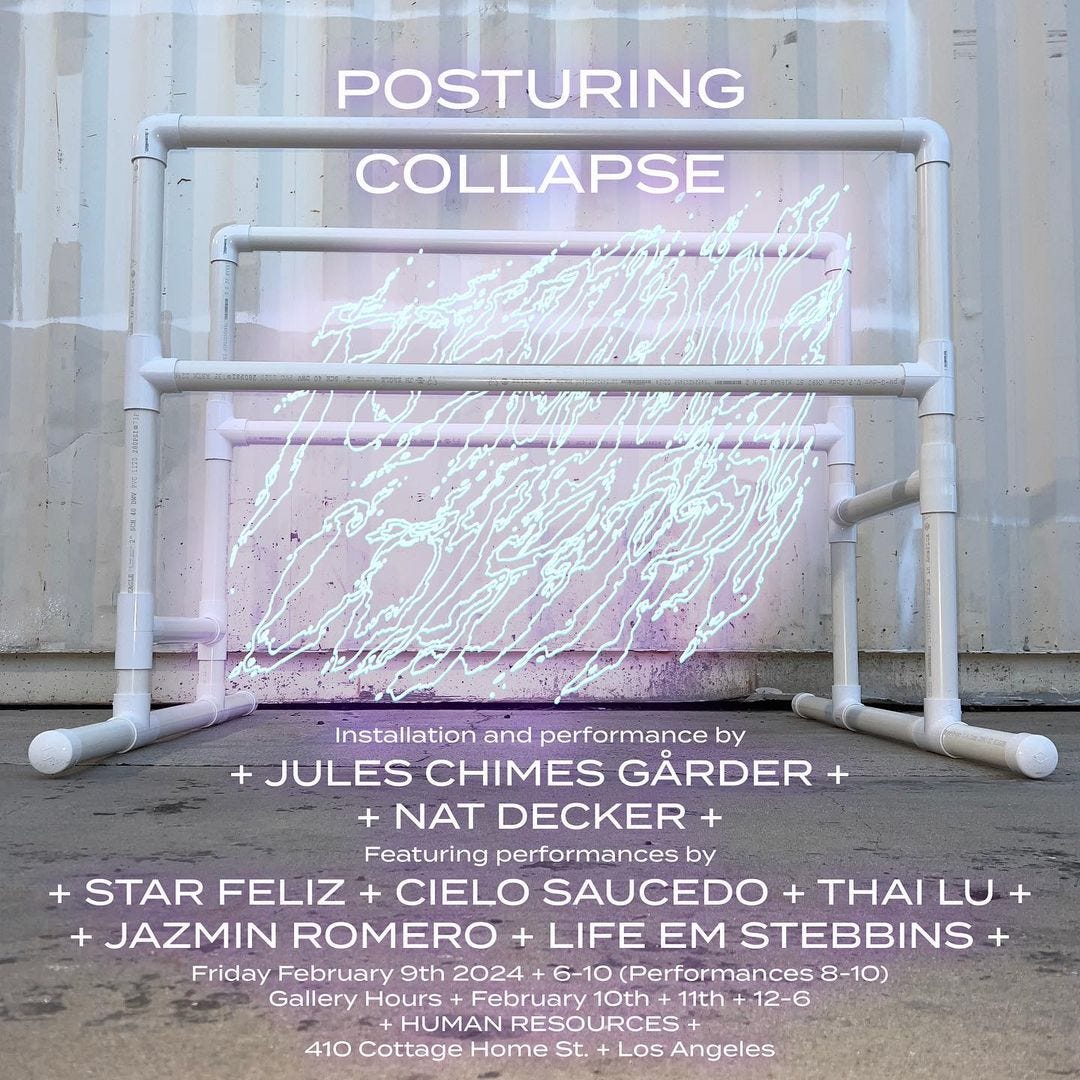NEWS
New Honors
Dark Disabled Stories by Ryan J. Haddad swept the Obie Awards, which opted to give cash directly to winning artists over a ceremony. The show won Best New American Play. The cast, including Dickie Hearts and Alejandra Ospina, was awarded a special citation for the way the artists “perform multitudinous languages and shapeshift modalities of communication.” Andrew Morrill (Director of Artistic Sign Language) and Alison Kopit (Access Dramaturg) won the Michael Feingold Award for their work on the access ecologies of production and performance. And dots (Sets) Collective won the award for Sustained Achievement in Design in part for their work on the play.
Dance/NYC awarded 29 individual disabled dance workers in the new cohort of the Disability. Dance. Artistry. Dance and Social Justice Fellowship Program: Alice Klugherz, Kiera Bono, Anh Vo, Krishna Washburn, Antonio Ramos, Leslie Taub, Branden Wallace, moira williams, Brandy Heyward, morgaine ann de leonardis, Buffy, Nzingha Hazelton, C. Meranda Flachs-Surmanek, Ogemdi Ude, Donald Lee, Rachel DeForrest Repinz, Fatima Logan-Alston, Sekou Walton, Issac Iskra, Shizu Homma, Jerron Herman, Sidiki Conde, Justina Kamiel Grayman, Zazel-Chavah O’Garra, Kiah Amara, and Anonymous (4).
The Ford Foundation recently announced $4.2 million in support for social justice films, with many projects advancing Disability Justice and inclusion, including Fire Through Dry Grass, Life After, Silent Treatment: Deaf Incarcerated People Fighting for Equality, Her Socialist Smile, Patrice, Unseen, and Untitled Dwarfism Project.
Getty Images and Verizon announced awards to 3 “Visionary Creators” making innovation disability representations: Oaklee Thiele, Erena Shimoda, and Sam Tokita.
New Works
Leah Lakshmi Piepzna-Samarasinha has published “Palestine is Disabled” on the Disability Visibility Project. And Truthout’s Kelly Hayes talked with Jane Shi, Leah, and Alice Wong about their “Crips for eSims for Gaza” campaign.
Iaraith Ní Fheorais and collaborators have launched Access Toolkit for Artworkers, with resources about “how to plan, produce, and exhibit accessible art projects including information on access riders, financial planning, slow production, display, and creating an accessible workplace.”
In ArtReview, Mariana Lemos writes about crip methods of creative access integrations.
Washington Post columnist Theresa Vargas profiled Suzanne Richard, Lisa Sniderman, and Jessica Wallach and their work on The Grieving Project, a “multimedia musical that is rooted in radical accessibility.”
Elektra KB’s contribution to La cultura no es una autopista, los museos podrían ser jardines, edited by Lucía Egaña Rojas and Giuliana Racco, explores disability, class, gender and being a Latin American artist working in art institutions in the global north.
Homebound by Em Kettner is on view at François Ghebaly (NYC) through Feb. 24. The show continues the artist’s practice of “depicting the disabled body in contexts where care exceeds a definition of sentimental help and becomes an ethos integral to the formation of community.”
Digital Reimaginings: Printing Towards Accessibility by Ellis Lane is open through May 26 at the Allen Memorial Art Museum at Oberlin College.
In Teen Vogue, disabled artist John Loeppky calls for an end to subminimum wages for disabled workers.
In “Malapropisms: Track Changes,” recently published in Art Journal Open, Pato Hebert works with a “prolific coauthor”: long COVID.
For Technology Policy Press, attorney Ariana Aboulafia writes about the ways internet privacy involve unique vulnerabilities for disabled people.
Disabled artist Jennifer White-Johnson debuted new mini-zines called “Climate Justice is Disability Justice” at a recent Day of Action at the U.S. National Portrait Gallery in DC.
Michelle Terry, the nondisabled artistic director of Shakespeare’s Globe, will play Richard III this summer, one of the most famous disabled characters in the British canon. The Disabled Artists Alliance expressed outrage and demanded an immediate recast in an open letter, but Terry has not backed down.
As other disabled artists use this as an opportunity to recirculate inaccurate analogies about disability and race in casting, now is a good time to read Dom Evans’s excellent 2017 essay, “Please Stop Comparing Disabled Mimicry to Blackface.”
CALLS
The NYC Department of Cultural Affairs is seeking comment on its proposed 5-Year Accessibility Plan, a document each city agency must draft and launch this year. You can find the plan here and leave comment here. Look for more analysis in next week’s issue about this plan!
Alice Wong is organizing a campaign demanding UCSF Health require that all staff, visitors, and patients wear a N95 mask in all of their locations. Learn how you can support here.
Access Living (Chicago) is hiring a Community Development Organizer Disability and Racial Justice. More here.
CERF+ is accepting applications for its Get Ready program, which provides individual craft artists up to $1,000 to conduct activities that will help safeguard their studios, protect their careers, and prepare for emergencies. More here.
Justice in Aging is seeking applications for its Justice in Aging Data for Equity Fellowship, a partnership with UMass Boston. More here.
Canada’s National accessArts Centre is hiring a Coordinator, Stakeholder Relations and an Interim Director, Presenting. More here.
FWD-Doc is searching for an Executive Director. More here.
EVENTS
Disability and Palestine Teach-In: A Conversation with Sawsan Zakaria, Marina Salman and Allie Cannington
TODAY, Monday, Feb. 5, 6 - 7pm ET, on Zoom
The Longmore Institute at SFSU is hosting a panel to discuss how the ongoing attack on Palestine relates to disability communities and disability justice.
Tangled Poetry Series
Various days and times, online
Tangled Arts + Disability is offering a series of free upcoming events hosted by Poet-in-Residence Rob Colgate (he/she/they) exploring how we read, write, revise, and exist as disabled poets.
POSTURING COLLAPSE
Friday, Feb. 9, 6 - 10pm PT, in-person at Human Resources (LA)
Posturing Collapse is a two-person exhibition featuring works by Jules Chimes Gårder and Nat Decker. The duo will present a collaborative performance and installation of sculpture and video which measures the intersections (and differences) of their histories with grief, disability, and sexuality. The opening will include performances by Star Feliz and Cielo Saucedo, thai Lu, Life Em Stebbins, and Jazmin Romero.
Fireweed Collective Groups
Various days and times, online
Fireweed Collective Groups are virtual spaces where folks can connect, and offer mutual aid with others who share similar life experiences and struggles. Groups run for a month. They meet once a week online for 60 to 90 minutes. All support groups are sliding scale and are facilitated by members of Fireweed Collective. Your donations allow us to offer services at a low cost.


